What is a dangling participle?
What is a dangling participle?
- Home
- Phrases
- Participles
- Dangling Participles
Do you know what dangling participles are? Do you know that you should avoid them?
Participles
Let's not get ahead of ourselves here. You need to learn about participles first. Participles are a type of verbal. That means that they're formed from verbs, but they don't act as verbs. Participles act as adjectives. Let's check out some examples of participles, shall we?

The filtered water tastes delicious.
Filtered is a participle. It's formed from the verb filter, and it's acting as an adjective. It tells us more about the noun water. Which water? The filtered water. If you look at the sentence diagram, you can see that filtered is connected to water. That shows us that it's modifying water.

Look at the shooting star!
Shooting is a participle. It's formed from the verb shoot, and it's acting as an adjective. It tells us more about the noun star. Which star? The shooting star. (Of course, shooting stars aren't actually stars. They're small pieces of rock that burn up as they hit earth's atmosphere. You probably already knew that though, right?)
Participial Phrases
Now that you understand participles, we need to talk about participial phrases.
I know. You just want to learn about participles that dangle, but trust me here. You need to learn this stuff first. You're being such a good sport. We're almost there.
Participles can be in participial phrases. (A phrase is a group of words without a subject and a verb, acting as one part of speech.) A participial phrase consists of a participle and its complements or modifiers. All of the words in the participial phrase come together to act as an adjective.
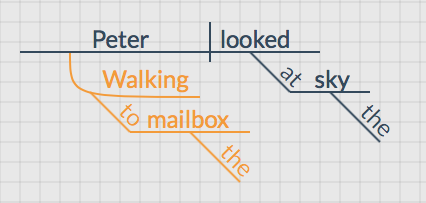
Walking to the mailbox, Peter looked at the sky.
Walking to the mailbox is a participial phrase. It contains the participle walking and the prepositional phrase to the mailbox. The whole participial phrase is acting as an adjective modifying the noun Peter.
(Psst! This sentence is from the children's book A Letter To Amy.)
Dangling Participles
Yay! You remember that participles act as adjectives, right? That means that they modify nouns.
Sometimes, it can be difficult to tell which noun a participial phrase is modifying. In fact, the noun that it is intended to modify may not be stated in the sentence! That's not a good thing. When this happens, it's a mistake called a dangling participle because it just dangles there with nothing to modify.
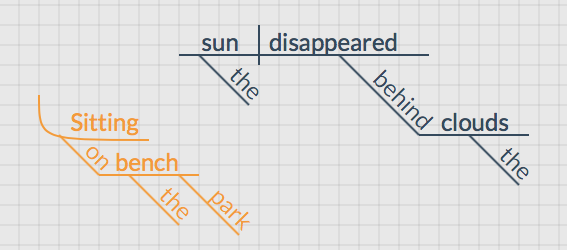
Sitting on the park bench, the sun disappeared behind the clouds.
Sitting on the park bench is a dangling participle. Where is the noun that sitting on the park bench modifies? It's not modifying sun or clouds. In fact, the noun that it's modifying isn't even in the sentence!
That poor participial phrase is just dangling there with nothing to modify. Poor thing.
To fix participles that dangle, move them so that they come right before or after the noun or pronoun that they're modifying.
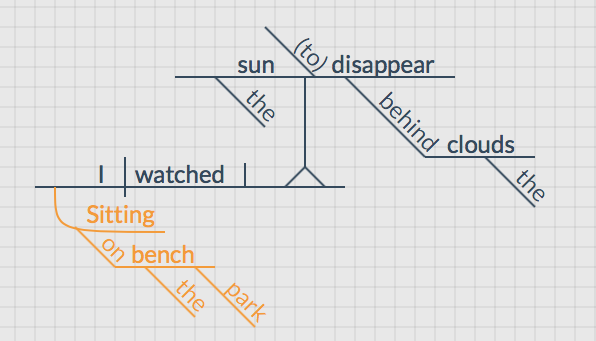
Sitting on the park bench, I watched the sun disappear behind the clouds.
Now, sitting on the park bench clearly modifies the pronoun I, so it's not dangling any longer.
Misplaced Modifiers
A closely related mistake is called a misplaced modifier. This happens when a participial phrase modifies a noun other than the one intended. This makes sense because it's a modifier (an adjective), and it's in the wrong place. One great thing about them is that they're usually quite entertaining.
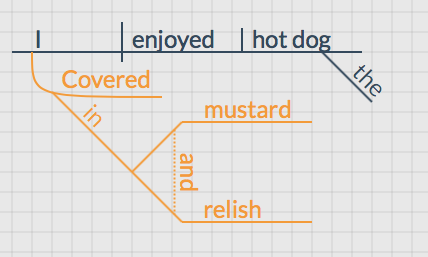
Covered in mustard and relish, I enjoyed the hot dog.
Covered in mustard and relish is a misplaced modifier. It contains the participle covered, and it's modifying the wrong word.
As the sentence is written, covered in mustard and relish is modifying I, but that doesn't make much sense!
The intended meaning of the sentence is probably that the hot dog was covered in mustard and relish, but it says that I was covered in mustard and relish.
Here's one way that you could fix that sentence.
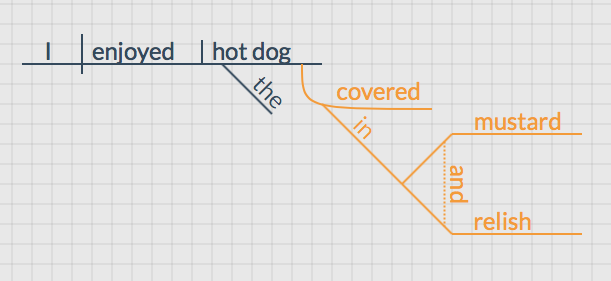
I enjoyed the hot dog covered in mustard and relish.
Covered in mustard and relish is now a regular, old participial phrase. It's not misplaced now because it properly modifies hot dog.
Note that we don't have a comma before this participial phrase. If we added a comma before the participial phrase, it would still go back to modify I. Why? Placing a comma before a participial phrase at the end of the sentence tells the reader that the phrase modifies a word earlier in the sentence. Since we want this phrase to modify the noun right before it, we don't add the comma. :)
Now you know that you should avoid dangling participles and misplaced modifiers unless you're trying to be funny. I hope that you enjoyed this lesson!
Summary
Let's review what we covered on this page!
- Participles are words that are formed from verbs but function as adjectives. That means that they modify nouns or pronouns.
- Participial phrases are participles plus all of the words that modify or complete the participle. The whole phrase functions as an adjective.
- Dangling participles are participles (or participial phrases) that don't have a word to modify within their sentence.
- When a participial phrase modifies a word other than the one intended, it's called a misplaced modifier.
If you'd like to teach or learn grammar the easy way—with sentence diagrams—check out our Get Smart Grammar Program.
It starts from the very beginning and teaches you grammar and sentence diagramming in easy, bite-size lessons.

Hello! I'm Elizabeth O'Brien, and my goal is to get you jazzed about grammar.
I ordered your complete set of courses and books. I am extremely pleased with the thoroughness of the materials, and I really like your videos.
- Rodney
This is original content from https://www.english-grammar-revolution.com/dangling-participle.html
Our Free Guide Gives You A Fun Way
To Teach And Learn The Basics v

Elizabeth O'Brien is the creator of Grammar Revolution.
Her lessons are guaranteed to give you more confidence in your communication skills and make you smile. :)

